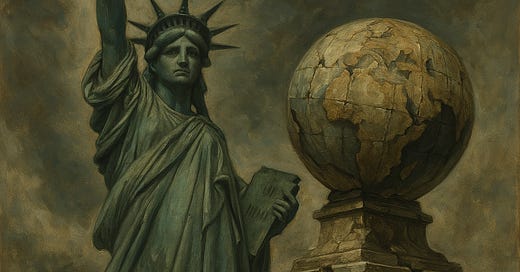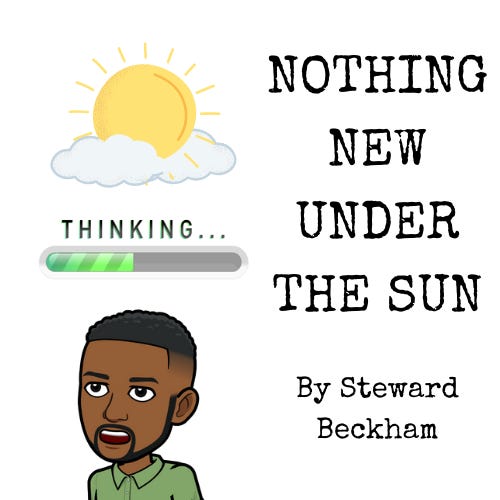How The Mighty Have Fallen
American soft power has always been our greatest export. We were once seen as a beacon of democracy, a country where dissent was patriotic, and opportunity wasn’t gated by class. But in 2025, that myth is in shreds. Op-ed writers are disappearing, voting rights are hollowed out for specific communities, and the return of a new Gilded Age or, instead, Silicon Age, has made us bait for propaganda, not a beacon against it.
Rereading Joseph Nye’s Soft Power in 2025 isn’t just haunting—it’s embarrassing.
I first encountered this essay in college during the mid-2010s. Mitch McConnell had just denied President Obama a Supreme Court seat, putting a polished sheen on the racialized reaction to his presidency that was bubbling from the darker corners of the Reagan coalition. At the time, I was in conversation with friends who carried international perspectives or had studied abroad before landing in Maryland. The dysfunction of Congress wasn’t new, but what was clear even then was that the GOP was becoming something darker—a movement afraid of an America that looked less like Mayberry and more like Martin Luther King Jr. Boulevard.
There was already dissatisfaction with Obama-era militarism and neoliberal bailouts. But still, we wondered: What was America becoming? Could it lead in the 21st century? Or were we in for a historic hangover—raving about the glory days while the world moved on?
Soft Power vs. Hard Power
In his essay, Nye defines soft power as the ability to co-opt rather than coerce.1 In a world where tanks can’t stop climate change and missiles can’t convince teenagers to believe in freedom, America’s strength was supposed to come from its ideas, its culture, and its openness. Hard power—military force and economic pressure—was becoming too unstable to lead the future.
What the U.S. had, uniquely, was something harder to measure: credibility, cultural reach, and the ability to export a lifestyle people genuinely wanted.
In 1990, American soft power looked invincible. According to UNESCO, American films comprised just 6–7% of global production but accounted for 50% of world screen time. The U.S. exported seven times more television than its closest competitor. And by 1981, it controlled 80% of global data transmission and processing.2
Even today, that legacy continues. The global film and video market is projected to grow from $308.47 billion in 2024 to $328.49 billion in 2025.3 Meanwhile, U.S. television remains the global revenue leader, expected to generate $289.76 billion next year.4
But it was never just about movies. It was jeans in Russia. Baseball caps in Tokyo. Satellite dishes in Nicaragua airing U.S. sitcoms while rebels fought American-backed guerrillas. Messy—but magnetic.
Nye didn’t romanticize the future. He warned that military strength wouldn’t automatically guarantee influence in a world reshaped by markets, migration, and climate change. He anticipated that terrorism, global warming, and weak states would test American leadership—and he recognized that countries like Japan had money and pop culture but lacked the openness to make it translate. At the time, that gave America the upper hand.
But even then, Nye’s optimism overlooked something essential. He wrote:
“…while Americans can also be parochial and inward-oriented, the openness of the American culture to various ethnicities and the American values of democracy and human rights exert international influence. West European countries also derive soft power from their democratic institutions, but America's relative openness to immigrants compared to Japan and Europe is an additional source of strength.”
That was 1990. A different America.
Wilde was Right
On a North American tour in 1882 (the first Gilded Age), Oscar Wilde famously said that America was the only country that went from barbarism to decadence without passing through civilization.5 It's harsh, but increasingly hard to refute. This is a country that reached global dominance without ever fully reckoning with its past. We inherited the crown before we could speak honestly about the sins that shaped us.
Sometimes it feels like we’re the spoiled child of the British Empire—thrust into global leadership without the emotional maturity to process what we inherited. The contradictions between what we say and what we are have never been more obvious, not just to the world, but to ourselves.
And yet, the biggest tragedy may be cultural. Nye believed soft power could extend American influence without violence and that our stories and values could inspire rather than impose. But what if America’s culture is the problem, not because it lacks beauty or reach, but because it lacks reckoning?
We rose to global dominance before developing the emotional maturity to process our history. Slavery, genocide, inequality, war—they were mythologized, not metabolized. And so we exported dreams built on contradictions we never resolved. That’s not just a branding problem. It’s emotional arrested development—and now it threatens our ability to lead, even as our stories still circle the globe.
Nye still believes in soft power.6 But the real question in 2025 isn’t whether we still have it.
It’s whether we’ve grown up enough to use it—with clarity, humility, and care.
Joseph Nye on soft power (1990): See Nye, Joseph S. Bound to Lead: The Changing Nature of American Power. New York: Basic Books, 1990. Chapter on “The Changing Face of Power.”
UNESCO statistic on U.S. media dominance: Nye cites UNESCO studies noting the U.S. accounted for 6–7% of films made globally but occupied ~50% of world screen time. Also in Bound to Lead, 1990.
Film and video market growth (2024–2025): “Film And Video Global Market Report 2024,” The Business Research Company.
U.S. television revenue projection (2025): Statista Market Outlook – TV & Video segment (2025).
Oscar Wilde quote: Often attributed from Wilde’s commentary on American culture, widely cited in cultural studies and diplomatic discourse.
Joseph Nye on American decline (2024): “Professor Joe Nye Coined the Term ‘Soft Power.’ He Says America’s Decline Under Trump Is Real,” Harvard PolicyCast, September 2024. Harvard Kennedy School









